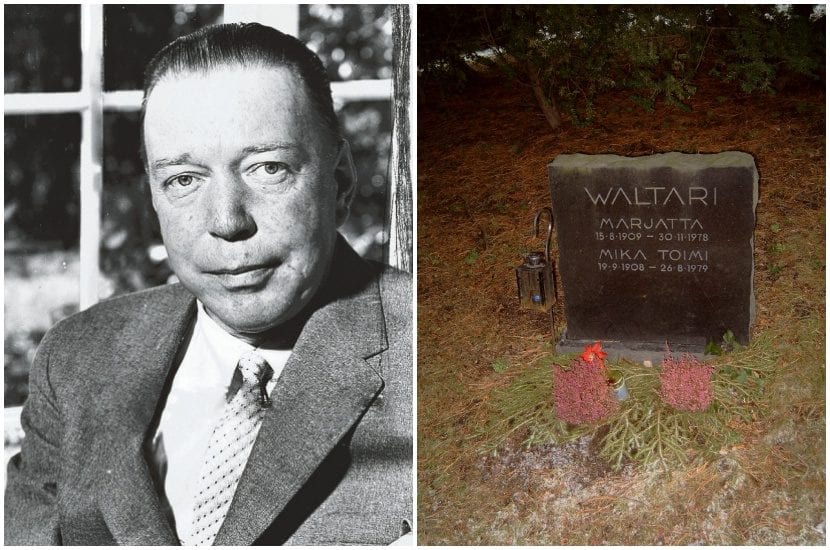
The Finnish writer Mika waltari died in Helsinki on August 26, 1979. He is one of the most internationally famous authors of this country. He is known for his historical novels and was a very prolific author. Its best known title is Sinuhé, the Egyptian. Today in his memory, I remember his work.
Mika waltari
Mika Toimi Waltari was born in Helsinki and he was (and still is) one of the most famous Finnish writers. He is known above all for his historical novels. Study Theology and Philosophy and worked as a journalist and literary critic for various Finnish newspapers and magazines. It was also member of the Finnish Academy. Wrote at least 29 novels, 6 poetry collections and 26 plays as well as several radio and film scripts, translations, and hundreds of reviews and articles.
His most acclaimed novel is Sinuhé, the Egyptian, published in 1945. But there were many more like Kuriton sukupolvi, Akhamaton, Miguel, the renegade, The dark angel, The siege of Constantinople, Dangerous game, Queen for a day, A stranger came to the farm, The queen of the imperial ball, From parents to children, Marcus the Roman, Carnac Vacations, A girl named Osmi. His works have been translated into more than 30 languages.
Sinuhé the Egyptian
It was lfirst and most successful of the historical novels of this author. This set in Ancient Egypt, during the reign of pharaoh Akhenaten. The protagonist is Sinuhé, your royal doctor, who tells his story in the exile after the death of this pharaoh. What's more, has lost its position due to his failed relationship with a courtesan. Also lose the house of his parents and all his inheritance. Apart from the events that occurred in Egypt, the novel also recounts the travel from Sinuhé by Babylon, Crete and other towns.
Fragments of the novel
Principle
I, Sinuhé, son of Senmut and his wife Kipa, have written this book. Not to sing the praises of the gods of Kemi country, because I am tired of the gods. Not to praise the pharaohs, because I am tired of their actions. I write for myself. Not to flatter the gods, not to flatter kings, not out of fear of coming or out of hope. Because during my life I have suffered so many trials and losses that vain fear cannot torment me and I am tired of hope in immortality as I am of the gods and kings. It is, then, for me only for whom I write, and on this point I believe that I differentiate myself from all past or future writers.
Final
Because I, Sinuhé, am a man and as such I have lived in all those that have existed before me and I will live in all those that exist after me. I will live in the laughter and in the tears of men, in their sorrows and their fears, in their goodness and their badness, in their weakness and their strength. As a man, I will live eternally in man and for this reason I do not need offerings on my grave or immortality for my name. This is what Sinuhé, the Egyptian, who lived alone all the days of his life, has written.
More snippets
- The truth is a sharp knife, the truth is an incurable sore, the truth is a corrosive acid. For this reason, during the days of his youth and his strength, man flees from the truth to the houses of pleasure and is blinded by work and feverish activity, with travel and amusement, with power and destruction. But a day comes when the truth pierces him like a spear and he no longer feels the joy of thinking or working with his hands, but finds himself alone, in the midst of his fellow men, and the gods do not bring any relief to his loneliness. .
- I write because wine is bitter on the palate. I write because I have lost the desire to have fun with women, and neither the garden nor the fish pond cause my eyes to rejoice. During cold winter nights, a black girl warms my bed, but I find no pleasure in her. I have thrown out the singers, and the noise of the stringed instruments and the flutes destroys my ears. This is why I write, Sinuhé, that I do not know what to do with wealth or gold cups, myrrh, ebony and ivory. Because I have all these goods and I have not been deprived of anything. My slaves continue to fear my staff, and the guards lower their heads and put their hands on their knees when I pass. But my steps have been limited and never a ship will board in the undertow.
The film
De 1954, produced it Darryl F. Zanuck for 20th Century Fox and directed it michael curtiz, the famous director of Robin of the woods o Casablanca. Among its interpreters are Edmund Purdom, Jean Simmons, Gene Tierney, Victor Mature, Michael Wilding, John Carradine or Peter Ustinov. It did not achieve the expected success, but it was nominated for an Oscar for best photography.